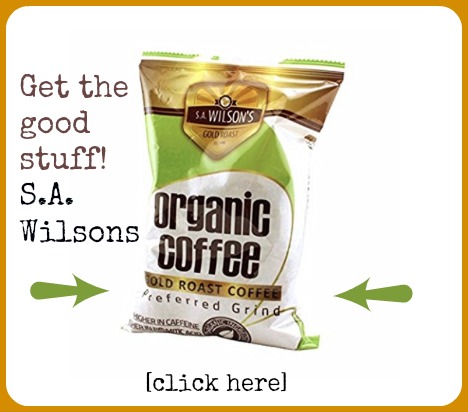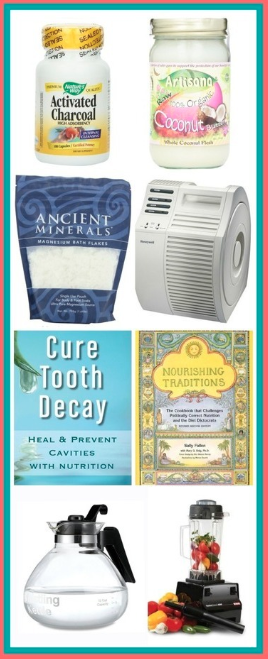Hi GUTSY readers, I am Anne Warren from Food That Satisfies. One of my greatest life passions is learning about health and implementing it into my family’s daily life. This, coupled with a desire to encourage & inspire others, has sparked my excitement for blogging about my journey! My blog is just a couple months old, but it’s growing fast, and I’m so happy to be able to share with you here today! Feel free to read my story and then learn all about the benefits of eating kale!
My Story
My own struggles with chronic fatigue, chemical sensitivities, and food allergies led me down a path of whole food eating and natural remedies, for which I am so blessed! The process, however, also meant that I spent a couple years of my life in the kitchen, during which I neglected some of the relationships that I hold dear. I realized that while I needed quality food for health, I also didn’t want it to rule my life. Thus, as a wife, mother, daughter and friend, it is so valuable to me to find balance within the context of healthy living. I want to help you gain health so that you can live out your dreams … not sacrifice them in the process. It is my hope that my blog posts will reflect that! If you’re interested in hearing my story, read more about it here.
I neglected some of the relationships that I hold dear. I realized that while I needed quality food for health, I also didn’t want it to rule my life. Thus, as a wife, mother, daughter and friend, it is so valuable to me to find balance within the context of healthy living. I want to help you gain health so that you can live out your dreams … not sacrifice them in the process. It is my hope that my blog posts will reflect that! If you’re interested in hearing my story, read more about it here.
I am so grateful to Caroline for giving me the opportunity to post here on GUTSY. We have been friends for a number of years, originally connecting over real food and natural health solutions. I will be posting on GUTSY periodically during the upcoming months and hope to connect with you during that time. If you enjoy what you read here, please join me for additional posts at www.FoodThatSatisfies.com!
Top 5 Benefits of Eating Kale
If I told you that kale is good for you and you should eat it more often, you’d probably respond with, “Yeah, I know”, and then go on living your normal kale-meager life without a second thought.
BUT … if you really understood just how nutritious and health-promoting kale is, you’d be banging down your grocery store doors trying to get as much of this cruciferous vegetable as you could possibly get your hands on!
So, let me share with you the top 5 reasons that you want to be eating this terrific food!

1. GLUTATHIONE, GLUTATHIONE, GLUTATHIONE
Glutathione is quite possibly the most important antioxidant in your body. This substance is found in every single cell of your body, and its overarching purpose is to protect your cells from things that might seek to damage them. Thus, glutathione fights against free radicals & toxins that might be introduced to your body from chemicals, radiation, or other environmental pollution.
If it’s inflammation you’re trying to soothe, glutathione is one of the very best things you can be putting into your body! It is terrific for helping both your liver and individual cells detoxify and bring down inflammation.
Due to it’s protective nature, glutathione is considered to be an amazing component both for preventing cancer and helping cancer patients as they undergo treatment. It is also one of the best preventative methods that a person can take to guard against neurodegenerative diseases such as Dementia, Alzheimer’s, and Parkinson’s.
Needless to say, getting glutathione should be top priority for anyone who wants to stay healthy and optimally functioning!
“So, how does one get more glutathione?” you may ask.
Surprise, surprise: KALE! The sulphur-rich amino acids found in most cruciferous vegetables naturally boost glutathione levels in a person’s body. Thus, you can increase your cellular glutathione by eating any cruciferous vegetable: broccoli, cabbage, or brussel sprouts … however, just wait until you hear about the other great health benefits that kale has packed into it!
2. Amazing Protection for your Eye Sight
In addition to glutathione, kale is chalk-full of other anti-oxidants. A few of the standouts when it comes to vision and eye health are lutein, zeaxanthin, and beta-carotene. These compounds are called carotenoids, and they are very important to helping maintain a person’s sight. They protect the body against oxidative stress (caused by a variety of free radicals) and are important in maintaining the delicate eye tissue.
According to brightfocus.org, “As many as 11 million people in the United States have some form of age-related macular degeneration. This number is expected to double to nearly 22 million by 2050.” In our western culture, eye problems are becoming more and more common. Could it be that we have pushed some of these healthy vegetables to the sidelines, causing more issues than we realize?
The carotenoids in kale are highly protective against degenerative eye disease such as macular degeneration, as well as cataracts. There is officially no “cure” for advanced macular degeneration; however, there are mountains of evidence showing us that we can completely prevent the problem in the first place by putting quality nutrients into our bodies. Studies show that the levels of lutein, zeaxanthin, and beta-carotene in a person’s blood all go up when kale is ingested.
**A key thing to note: All of these antioxidants are fat-soluble, meaning your body needs good fats in order to best process them. Thus, you will want to be sure to eat your kale with some sort of fat to get the full benefits of these antioxidants. This usually isn’t too much of a problem since cooked kale is often served with butter or olive oil, and raw kale can be dressed with a vinaigrette in salad, used with coconut milk in a smoothie, or crisped with a little olive oil as a chip.
3. It’s a Major Cancer-Fighter!
As we discussed at the beginning, glutathione is an antioxidant that is super protective against cancer-causing free radicals. It reduces inflammation, promotes healthy detoxification (which gets rid of toxins and cancerous growths) and counters the effects of things such as free radicals.
In addition to glutathione, kale contains compounds known as indoles. Indoles are a class of phytochemicals that have been shown to greatly reduce estrogenic activity. A majority of cancerous tumors are estrogenic in nature, meaning that extra estrogen in a person’s body will greatly accelerate a tumor’s growth. Estrogen causes cells to grow, and not being able to efficiently detoxify estrogen provides what is necessary for tumors to grow … and grow … and grow.
Estrogen dominance is a huge problem for females. It is extremely common in the United States to find women who have a much higher ratio of estrogen to progesterone. Unfortunately, in our society, hormones are thrown around right and left, without much regard for the delicate balance that needs to be maintained between the great complexity of hormones in a body. Our bodies are also stressed with high amounts of chemicals, which eventually overloads our detoxification systems. These are just a couple of the many things that leads to the epidemic of cancers that we are seeing today.
Fortunately, we have a food that specifically targets both the estrogen and the detoxification system! Indoles work by detoxifying (getting rid of) estrogen, so that it isn’t sitting around creating tumors in your body. It enables your body to do the job it was intended to do – keeping the good and getting rid of the bad! Just like glutathione, indoles are found in most cruciferous vegetables, so please, PLEASE make these a part of your regular diet!
4. Vitamin K – It Prevents Osteoporosis, Atherosclerosis, and Type II Diabetes
- Osteoporosis : Decreasing of bone mass throughout your body; it makes a person easily prone to fractures
- Atherosclerosis: The build-up of plaque on artery walls, leading to strokes, heart attacks, or peripheral vascular disease
- Type II Diabetes: Insulin resistance that, over time, can damage the eyes, kidneys, nerves and/or heart.
The three conditions listed above are some of the most common health issues experienced in our society today. Millions of people are on expensive medications designed to combat symptoms of these diseases, yet there are so many terrible side effects of the drugs, that it leaves most people sicker than when they started. Wouldn’t it be great to have something that fight to prevent these conditions, while at the same time improving your overall health?!!
Hmmmm …. let’s see. What might have the capability of doing something like that?
Yep, you guessed it. The one and only kale!
The high amounts of Vitamin K that are found within kale help activate a protein (osteocalcin), which binds with bone minerals to build strong, lasting bones, thus preventing osteoporosis. In addition, the Vitamin K in kale prevents build up and calcification of arteries, preventing cardiovascular disease and everything associated with it. Finally, studies show that Vitamin K both prevents and reduces the effects of Type II Diabetes.
“Killing three birds with one stone” … or shall I say “Knocking out three diseases with one superfood!”

5. High in Many Other Vitamins & Minerals: Calcium, Iron, Vitamin C, Vitamin A
On the heels of Vitamin K, let’s delve into the benefits of calcium that you receive from eating kale. One of the major problems in osteoporosis is that a person lays down bone without the proper mineral content, leaving bones brittle and weak. Both Vitamin K & Calcium are huge players in this process. A majority of the calcium in your body goes toward building bones & teeth, but if there isn’t enough calcium available to your body, your body steals calcium from your bones to use for other vital functions such as blood clotting, nerve function, cell signaling, and activation of enzyme reactions. Getting a significant amount of calcium that your body can readily absorb is very important in avoiding osteoporosis!
Additionally, iron anemia is something that many women struggle with. The iron in kale, while certainly not the highest of all vegetables, is also nothing to sneeze about. It is important that a person consume Vitamin C at the same time as iron, because it significantly increases the body’s absorption of the iron. Fortunately for us, kale contains high levels of Vitamin C!
The Vitamins A & C, which are also found in kale, are extremely beneficial to a person. 1 cup of cooked kale contains 98% of a person’s recommended daily value(DV) of Vitamin A and 71% of the recommended DV of Vitamin C. It’s truly amazing how many great nutrients are packed into kale. In addition to all of these, it is a good source of manganese, copper, Vitamin B6, fiber, potassium, Vitamin E, and Vitamin B2, Magnesium and Omega-3 (ALA) fats!
Eat MORE Kale!
In conclusion, kale is a wonderful source of antioxidants & vitamins. These vital nutrients are protectors in the body, enabling it to fight against things such as cancer, neurodegenerative & cardiovascular diseases, and diabetes. While there might be future research yet to come showing even greater benefits, it is pretty evident at this point that we can’t go wrong adding kale to our diets! Please check back here in the days to come as we delve into some wonderful kale recipes! If you are interested in learning more about kale and all its benefits, please check out one of the resources below:
___________
**As a side note, some people have troubles digesting kale due to the higher insoluble fiber content. This often occurs if a person has SIBO (Small Intestine Bacterial Overgrowth). If kale seems to give you problems, this is a great indicator to you that you need to rebalance your gut flora. Let this serve as a clue to attaining better health!
























Speak Your Mind